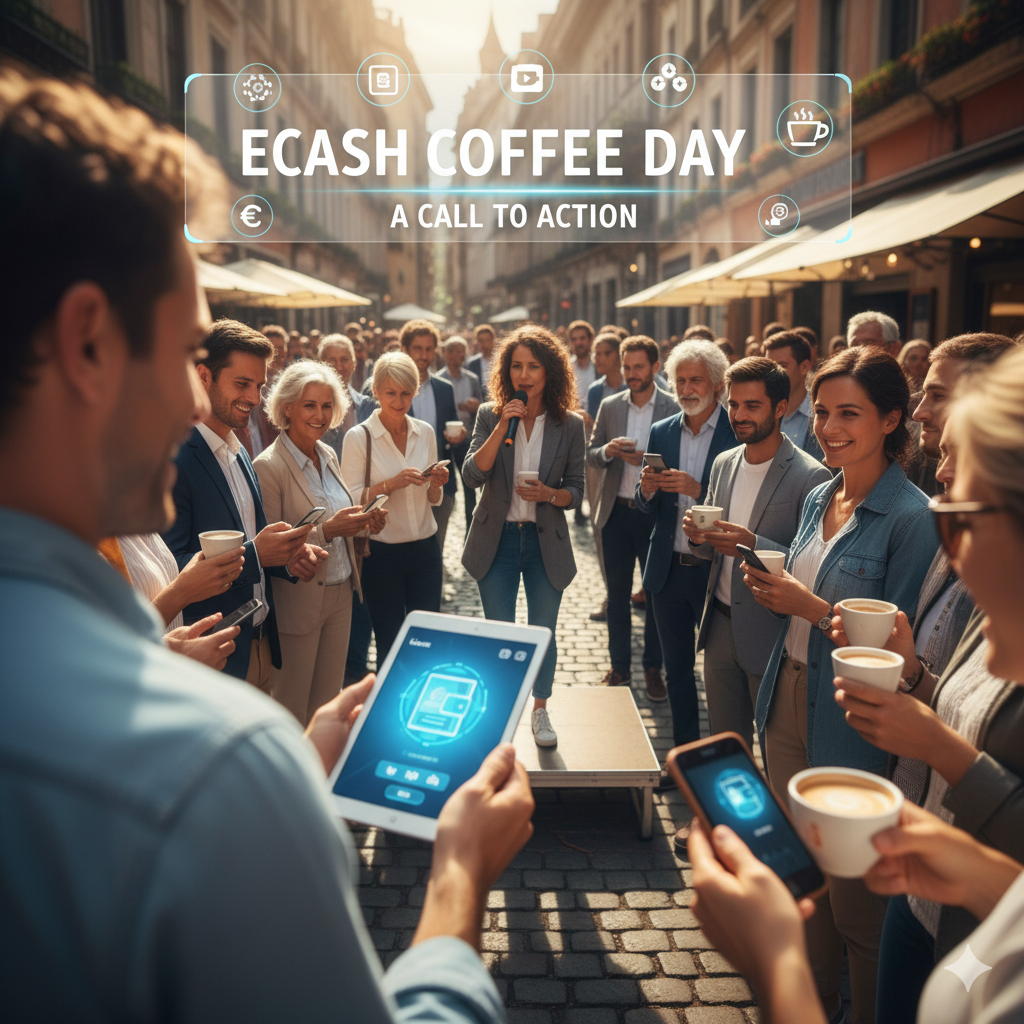Key Points:
-
Ecash Coffee Day marks the first-ever Bitcoin purchase using ecash, a milestone for financial privacy and digital sovereignty.
-
The movement now represents a broader push for privacy-preserving Bitcoin protocols such as Fedimint, Cashu, and ARK.
-
Rising global surveillance and authoritarianism are turning financial privacy from a technical goal into a humanitarian necessity.
From a Cup of Coffee to a Movement
What began as a simple purchase in Prague has become a global reminder of why privacy matters in digital finance. Four years ago, developer Eric Sirion bought a cup of coffee at Paralelní Polis during the Hackers Congress using ecash on Bitcoin — specifically through the Fedimint protocol, a Chaumian ecash system designed for private transactions.
That moment marked the world’s first ecash transaction on Bitcoin, symbolizing the convergence of two revolutionary ideas: Bitcoin’s decentralized resilience and David Chaum’s vision of untraceable, fungible digital money.
What seemed like a modest technical success became something larger — a proof of concept for financial freedom. And today, as Ecash Coffee Day returns, it is no longer a nostalgic commemoration but a rallying point for digital privacy.
The Legacy of Ecash and Bitcoin’s Privacy Gap
Ecash is not new. The concept dates back to the 1980s, when David Chaum’s DigiCash pioneered private digital transactions using cryptographic blind signatures. Though the company failed commercially, its philosophy endured: that privacy is a fundamental component of free exchange.
When Hal Finney, the first recipient of Bitcoin from Satoshi Nakamoto, wrote about Bitcoin’s future, he envisioned additional layers built to enhance privacy. Bitcoin, as he saw it, needed more than decentralization — it needed discretion.
Sirion’s 2021 coffee purchase turned that vision into reality. Using Fedimint, a federated custody protocol, Bitcoin users could send and receive ecash tokens redeemable for Bitcoin without revealing transaction details. Soon after, Cashu, a lightweight single-mint variant, emerged — enabling faster experimentation and local deployment.
Together, they fueled a grassroots ecosystem of privacy-focused innovation atop Bitcoin’s infrastructure.
Privacy as the Next Frontier of Bitcoin Scaling
Since that first coffee, the broader Bitcoin ecosystem has accelerated its exploration of privacy at every layer.
-
Fedimint continues to mature as a federated custody solution, emphasizing resilience and community trust.
-
Cashu offers rapid deployment for smaller mints, enabling micro-economies and experimental payment apps.
-
BitVM, a trust-minimized scaling system, has inspired ZK Coins, an ecash-like model integrating zero-knowledge proofs.
-
ARK and Spark, meanwhile, are exploring scalable, privacy-enhancing transaction layers for Lightning and statechains.
-
On-chain, technologies like WabiSabi, CoinSwap, and Silent Payments are already improving fungibility and breaking linkability.
This expanding ecosystem signals a deeper truth: Bitcoin cannot scale without privacy. As adoption grows, transparency becomes a double-edged sword — empowering oversight but also inviting surveillance.
Privacy as a Human Imperative
The shift from celebration to activism is driven by global realities. Around the world, ecash is quietly empowering activists, journalists, and citizens under surveillance regimes. In nations where dissent is punished, the ability to transact privately can be a matter of safety, not speculation.
“Without privacy, Bitcoin risks becoming vulnerable to coercion and abuse,” Sirion has said. “With privacy, it becomes a lifeline.”
In an age of digital identity tracking, CBDCs, and AI-driven monitoring, the message of Ecash Coffee Day resonates far beyond crypto circles. Privacy is no longer just a feature — it’s a necessity for autonomy.
From Celebration to Commitment
As Fedi and other privacy-focused teams mark Ecash Coffee Day, the event stands as both a celebration and a challenge. It commemorates how far the Bitcoin community has come — but also underscores how far it still must go.
Developers, funders, and users alike are being called to sustain this progress: by building, supporting, and advocating for privacy-preserving tools that safeguard the core values Bitcoin was built upon.
Because ultimately, this is not just about software or coins — it’s about people. Ecash Coffee Day reminds us that the freedom to transact privately is a human right. And until that right is guaranteed by default, the mission that began with a single cup of coffee remains unfinished.
Comparison, examination, and analysis between investment houses
Leave your details, and an expert from our team will get back to you as soon as possible













Leave a comment